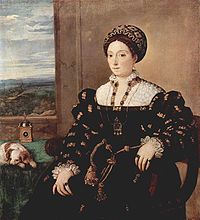
Eleonor Gonzaga (1493–1570)
Encyclopedia

Francesco II Gonzaga, Marquess of Mantua
Francesco II Gonzaga was the ruler of the Italian city of Mantua from 1484 until his death.-Biography:Gonzaga was born in Mantua, the son of Marquess Federico I Gonzaga. He had a career as a condottiero acting as Venice's commander from 1489 to 1498...
, and Isabella d'Este
Isabella d'Este
Isabella d'Este was Marchesa of Mantua and one of the leading women of the Italian Renaissance as a major cultural and political figure. She was a patron of the arts as well as a leader of fashion, whose innovative style of dressing was copied by women throughout Italy and at the French court...
. Her father was a notorious libertine
Libertine
A libertine is one devoid of most moral restraints, which are seen as unnecessary or undesirable, especially one who ignores or even spurns accepted morals and forms of behavior sanctified by the larger society. Libertines, also known as rakes, placed value on physical pleasures, meaning those...
, and her mother, a gifted patroness of the arts of the late Italian Renaissance
Italian Renaissance
The Italian Renaissance began the opening phase of the Renaissance, a period of great cultural change and achievement in Europe that spanned the period from the end of the 13th century to about 1600, marking the transition between Medieval and Early Modern Europe...
. On 25 September 1509, aged just sixteen, she married Francesco Maria I della Rovere
Francesco Maria I della Rovere
Francesco Maria I della Rovere was an Italian condottiero, who was Duke of Urbino from 1508 until 1538.- Biography :...
, duke of Urbino, son of Giovanni della Rovere, duca di Sora e Senegaglia, and Giovanna da Montefeltro, and nephew of Pope Julius II
Pope Julius II
Pope Julius II , nicknamed "The Fearsome Pope" and "The Warrior Pope" , born Giuliano della Rovere, was Pope from 1503 to 1513...
. Their two sons and three daughters would all have progeny.
Eleonora, who was largely responsible for the internal government of Urbino during her husband's exile, was an important patron of the arts in her own right. A princess of the highest culture, she was the friend of Pietro Bembo, Sadolet and Baldassarre Castiglione, as well as the poet Torquato Tasso
Torquato Tasso
Torquato Tasso was an Italian poet of the 16th century, best known for his poem La Gerusalemme liberata , in which he depicts a highly imaginative version of the combats between Christians and Muslims at the end of the First Crusade, during the siege of Jerusalem...
. Titian
Titian
Tiziano Vecelli or Tiziano Vecellio Tiziano Vecelli or Tiziano Vecellio Tiziano Vecelli or Tiziano Vecellio (c. 1488/1490 – 27 August 1576 better known as Titian was an Italian painter, the most important member of the 16th-century Venetian school. He was born in Pieve di Cadore, near...
painted her once formally (in 1537, a companion to his painting of her husband Francesco from the same year), but her face appears to be recognisable in three other Titian paintings of about that time: 'La Bella', 'Girl in the Fur Cloak' and possibly the 'Venus of Urbino' commissioned by her son Guidobaldo.
Issue
- Giulia della Rovere (d.1563) married Alfonso d'Este, Lord of MontecchioAlfonso d'Este, Lord of MontecchioAlfonso d'Este was an Italian nobleman. He was the illegitimate son of Alfonso I d'Este, Duke of Ferrara by his lover Laura Dianti...
and had issue (were parents of Cesare d'Este, Duke of Modena); - Elisabetta della Rovere (d.6 June 1561) married Alberico Cybo, Prince of Massa and Carrara and had issue (ancestors of Maria Teresa Cybo-MalaspinaMaria Teresa Cybo-MalaspinaMaria Teresa Cybo-Malaspina was the Duchess of Massa and the Princess of Carrara from 1731 until her death in 1790. She was the eldest child of her parents, Alderano I Cybo-Malaspina and his wife Ricciarda Gonzaga...
); - Guidobaldo della RovereGuidobaldo II della RovereGuidobaldo II della Rovere was an Italian condottiero, who was Duke of Urbino from 1538 until his death.- Biography :...
(2 April 1514 - 28 September 1574) married Giulia Varano and had issue; married Vittoria Farnese (daughter of Pier Luigi Farnese, Duke of ParmaPier Luigi Farnese, Duke of ParmaPier Luigi Farnese was the first Duke of Parma, Piacenza and Castro, from 1545 to 1547.Born in Rome, Pier Luigi was the illegitimate son of Cardinal Alessandro Farnese...
) had issue (ancestors of Maria Teresa Cybo-Malaspina); - Giulio della RovereGiulio della RovereGiulio della Rovere, also known as Giulio Feltrio della Rovere was an Italian Catholic Cardinal of the della Rovere family....
(1533–1578) became a cardinal then later had issue (illegitimate); Ippolito and Giulio. - Ippolita della Rovere (b.1525) had issue.

